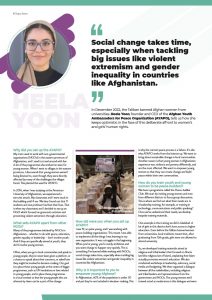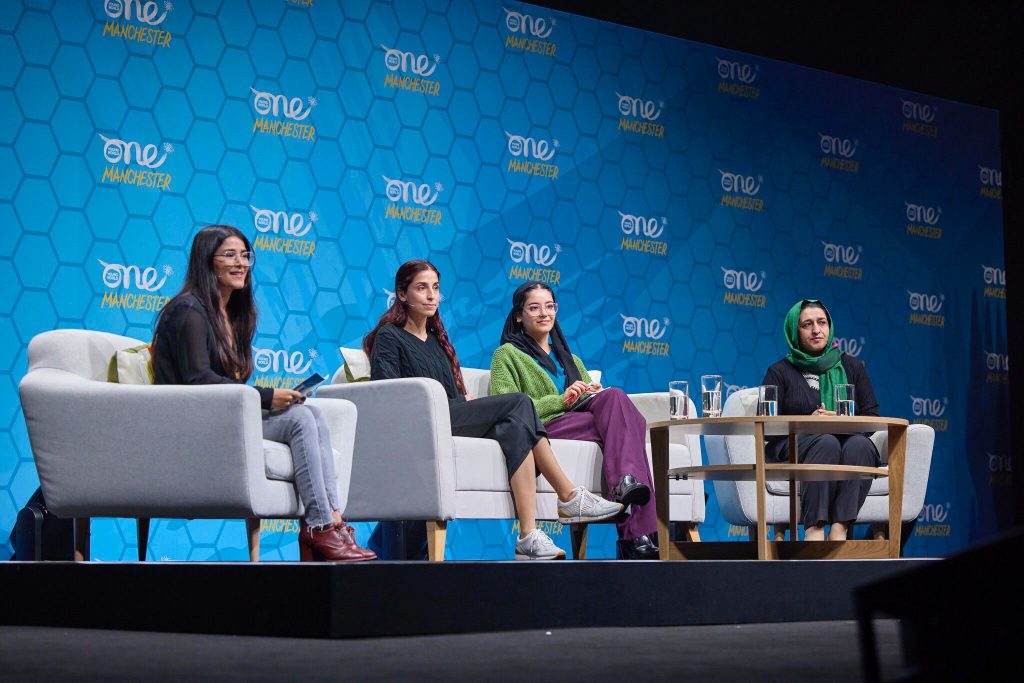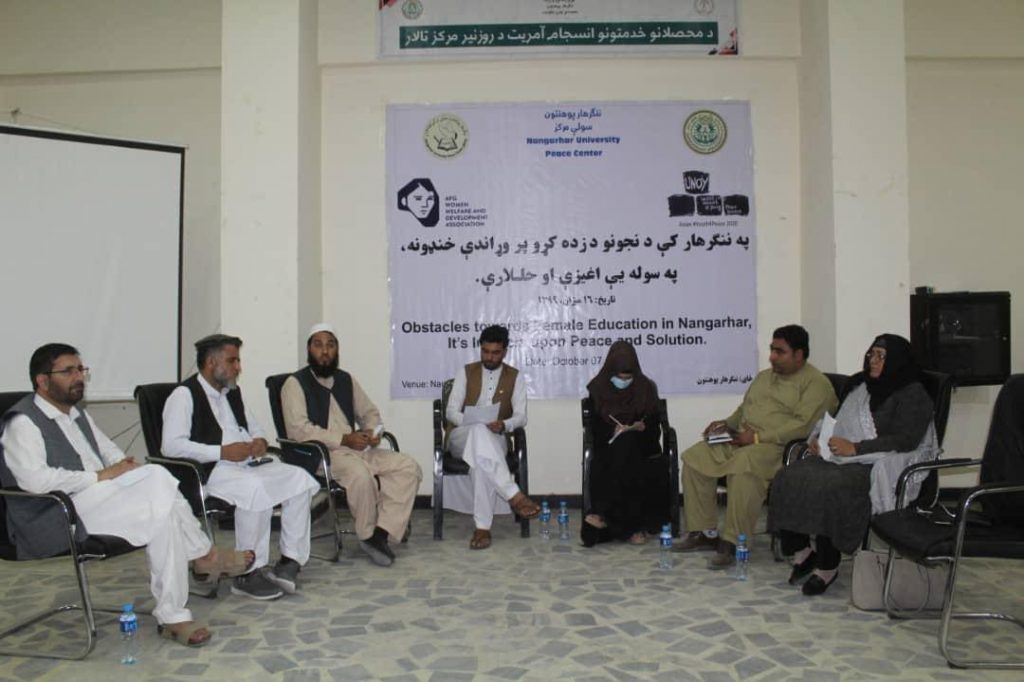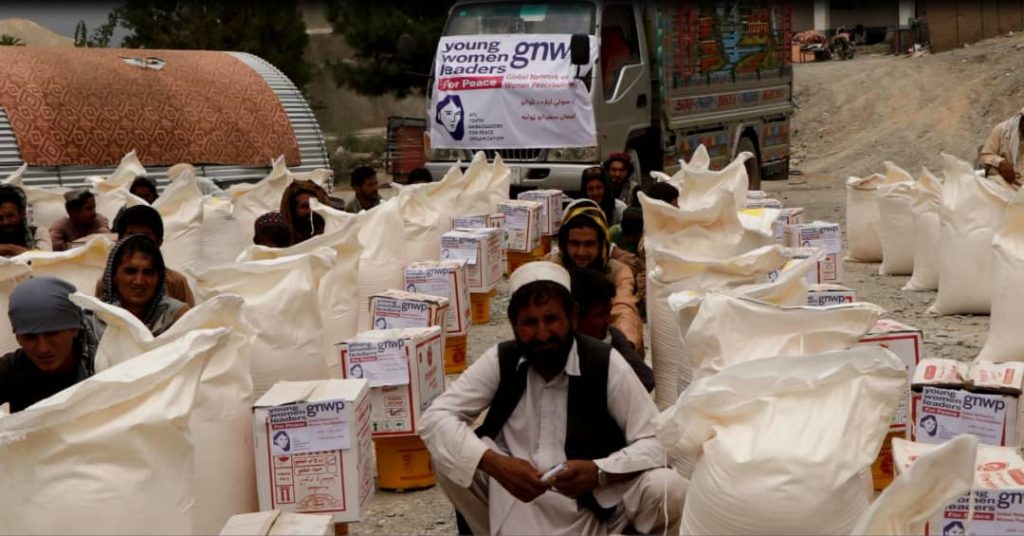Heela Yoon: “Social change takes time, especially when tackling big issues like violent extremism and gender inequality in Afghanistan.”
In December 2022, the Taliban banned Afghan women from universities. Heela Yoon, founder and CEO of the Afghan Youth Ambassadors for Peace Organization (AYAPO), tells us how she keeps optimistic in the face of this deliberate affront to women’s and girls’ human rights.
Why did you set up the AYAPO?
My mum used to work with non-governmental organisations (NGOs) in the eastern provinces of Afghanistan, and I used to travel around with her. A lot of the programmes she worked on were for young women. When I went to villages in the eastern provinces, I discovered that young women weren’t being listened to, even though they were directly affected by many of the challenges the villages faced. This planted the seed for AYAPO.
In 2016, when I was studying at the American University of Afghanistan, we experienced a terrorist attack. My classmates and I were stuck in the building until 4 am. We later found out that 11 students and one professor had lost their lives. That is when my classmates and I decided to set up an NGO which focused on grassroots activism and preventing violent extremism through education.
What sets AYAPO apart from other NGOs?
Many of the programmes initiated by NGOs in Afghanistan – whether to do with peace, education, gender equality or leadership – don’t involve youth. And if they are specifically aimed at youth, they don’t involve young women. Often, when you go to local communities and speak to young people, they’ve never been given a platform, or a chance to speak about their concerns, or asked how they might be involved in decision-making. Our goal is to place these young people at the centre of bigger programmes, such as UN resolutions or laws related to young people, and to place these programmes in a local context so that the young people who are affected by them can be a part of the change.
How old were you when you set up AYAPO?
I was 19, so quite young, and I was working with peace-building organisations. This meant I was able to implement all the things I was learning in my own organisation. It was a struggle in the beginning. When you’re young, you’re overly ambitious and you want change to happen very quickly. This is something I’ve learned while working with NGOs; social change takes time, especially when tackling big issues like violent extremism and gender inequality in countries like Afghanistan.
Why is it important to you to empower young Afghans?
In Afghanistan, 60% of the population is under 30 and yet they’re not included in decision-making why AYAPO works from the bottom up. We want to bring about sustainable change in local communities. Another reason is that young women in Afghanistan experience war, violence and poverty differently, and are the most affected. We want to empower young women so that they can create change and build peace within their own communities.
How do you train youth and young women to be peace-builders?
We have a programme called the Peace-builder Club. We start by inviting young women and men from different districts to focus group discussions. This is where we find out what their needs are. Is it leadership training, for example, or training in technology, communications and public speaking? Once we’ve understood their needs, we develop bespoke training materials.
One example is the training we did in Jalalabad. A lot of girls in this district don’t have access to higher education. Even before the Taliban banned women from universities, local traditions meant that, after graduating from 12th grade, girls were not allowed to attend university. So, we developed training materials aimed at religious and tribal leaders that focused on Sharia law (the religious law of Islam), explaining how Islam actually promotes women’s education. We also conducted workshops in leadership, advocacy, social media and budgeting. We then organised a dialogue between all the stakeholders, including religious and tribal leaders and representatives from the government and NGOs. The young women we’d trained acted as moderators in this dialogue and were able to ask religious and tribal leaders questions about their rights to an education. Many people’s mindsets were changed, thanks to this experience.
Can you share other examples of the work AYAPO does?
We often face humanitarian crises in Afghanistan, such as earthquakes and floods, and yet humanitarian responders are men. Afghan culture and gender restrictions mean that women don’t feel comfortable talking about their needs to male responders. We train female responders to work with women in times of crises and teach them how to prioritise their needs.
Another project we’ve been working on is the provision of computer science and English as a foreign language (TOEFL) courses for women in the eastern provinces, which we’ll hopefully implement in 2023.
What successes has AYAPO had?
The training we’ve provided to so many young women and the peace-building dialogues we have organised with communities and religious leaders are success stories. We are the first youth- and women-led NGO to have created a safe space for engagement with religious and tribal leaders in the eastern provinces, a region of Afghanistan where change doesn’t come easily.
Another success story is our young peace-builders programme, which connects young people with donors and scholarships so that they can continue their education in Afghanistan. We’re also proud to have provided humanitarian support for young people and survivors of the 2022 earthquake in Paktika province, where more than 600 people died. Then there’s the international advocacy work we do to remove the current ban on girls’ education. We have been working with Human Rights Watch as well as other organisations to provide educational opportunities for girls who don’t have access to education on the ground.
How do you work around restrictions on girls’ education?
If the courses aren’t university-related and there are only girls and a female teacher, and no men are in the classroom, then there aren’t any restrictions. We have also partnered with an educational institute that educates girls to deliver our training, but that doesn’t mean we don’t experience barriers. We wanted to start a programme called Peace Goes to School, which aims to train high school girls in peace-building and advocacy, as well as provide them with career coaching classes, but the recent ban on girls’ secondary education has meant that we can’t implement this project.
Another issue is security and safety. Most of our peace-builder members are female volunteers, and the restriction on women’s movements within Afghanistan is affecting their work. The Taliban has also said that women can’t work with NGOs. If we do any advocacy work in the country, we’re putting our members at risk, and we don’t have the resources to evacuate them if anything happens.
How do you stay optimistic?
I have my ups and downs. When you start a project to solve one problem, another problem comes up, or the government implements a new restriction or policy. There are moments when I don’t feel like being optimistic at all, but there are moments when I need to be optimistic. Young women and girls are banned from education; they don’t have any basic human rights. I’m motivated because I’ve been privileged to continue my education and work without restrictions and outside of Afghanistan. I can use these opportunities to help others achieve the same things.
What can the international community do?
I’m always in support of peace-building dialogues. Afghans are tired of war, and I think the right way for the international community to help is to have meaningful engagement with the Taliban. The Taliban thinks the international community doesn’t care about Afghan women anymore, so it can do whatever it wants. That’s where we need to prove it wrong.
Neighbouring countries can also have an influence on the Taliban, so the international community could work with countries that border Afghanistan to start engaging meaningfully with the Taliban. When I say ‘meaningful engagement’, I mean including the people of Afghanistan, as well as women and young people. It shouldn’t be men sitting at the table talking about Afghan women’s rights. The international community should act as our ally, not our representative, and stop seeing Afghans or Afghan women as victims.
I also think there could be more restrictions put in place, such as travels restrictions for Taliban leaders. And there needs to be safe spaces for activists in Afghanistan, who are standing up against the Taliban’s restrictive policies. Lastly, I think the international community should take responsibility for what is happening in Afghanistan and acknowledge the mistakes it has made.
What can we do as individuals?
Making yourself aware of what’s happening in Afghanistan is the first thing you can do. A lot of people I’ve met in the UK have seen a few news headlines, but they don’t really know what’s happening to women in Afghanistan; for example, there are no health facilities available to women or pregnant women in local communities. Their movements are restricted, and there won’t be enough female doctors because the Taliban has put restrictions on girls going to university. There’s also a widening illiteracy gap, especially among young women, and a lot of young women are unemployed. There are also many widows in Afghanistan, who are unable to provide for their families. How is that going to affect Afghan households in the long run?
You can help by connecting with international and local NGOs who are providing humanitarian support to Afghanistan. Learn about the different NGOs and make a donation. Even a small donation can bring about a lot of change for one family. Holding your government to account is another thing you can do. The British government, for example, can influence what’s happening in Afghanistan right now.
Then there are the Afghan refugees who come to your country. Go to your local refugee centre, help out, provide any support you can. This might be a donation, or helping refugees to learn how to make use of the services that are available such as doctors and transportation.
Having an educated family is certainly a blessing. I didn’t know what gender discrimination really meant until I started studying and working with NGOs. A lot of people think I’m working with NGOs because there were no other career options for women in Afghanistan, but this isn’t true.
What did you want to be when you were growing up?
My first career choice was to work in the foreign service and become the first young female ambassador. That’s why I studied International Relations and Diplomacy for my first undergraduate degree. Later on, through working with NGOs and starting up my own NGO, I focused more on peace-building and humanitarian work. Now, I would like to work with a UN peace-keeping mission and refugees.
I also have a bachelor’s degree in finance and a master’s in international trade and finance because there aren’t enough women working in this area. When I was working at the Ministry of Foreign Affairs, it was only men working in economics, trade and finance.
What’s your philosophy in life?
For me, every opportunity is a blessing. My philosophy is to be grateful for whatever comes. I always try to see the silver lining because I’ve realised that things happen for a good reason. I’ve also learned to be a more proactive rather than reactive, and think that using whatever opportunities and privileges I have, and sharing them with others, will keep me moving forwards and help others to move forwards, too.
But I’m still in my early twenties. I’m also exploring and learning about how life should be, so I can’t say I have a definite philosophy.
Do you think you’re making an impact?
I hope so because if I thought I wasn’t making an impact I wouldn’t continue. I usually give myself a pep talk at the end of the day when life becomes overwhelming. I think self-care and telling yourself that you’re proud of what you are doing is something that young women should be doing. We often undermine ourselves. We downplay our problems and the things we’ve achieved in life.
Most of the time, we put it down to luck. We don’t appreciate our skills and talents. I think it’s very important to tell yourself that you’re proud of what you’ve achieved so far and to take everything step by step. Things happen gradually. You’re not responsible for the world’s problems but if you can make a small impact on people’s lives, that’s something.
ABOUT HEELA
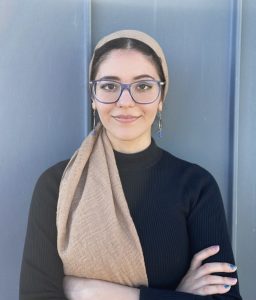
© Taqwa Zaitoon
In addition to her role as founder and CEO of AYAPO, Heela Yoon is Youth Leader at the Global Partnership for Education. She has worked for Oxfam, Amnesty International and RESULTS UK, among other NGOs. In 2022, she was part of the United Nations cohort of Young Leaders for the Sustainable Development Goals. Heela has a master’s in International Business, Trade and Commerce from Leeds Beckett University, a bachelor’s in Business Administration from the American University of Afghanistan and a bachelor’s in International Relations and Affairs from Kabul University, Afghanistan. Heela is currently based in Leeds, UK.
AYAPO empowers young Afghan youth and women to become active peace-builders. It aims to amplify their voices at the local, national and international levels, with the ultimate goal of fostering sustainable and just peace.

